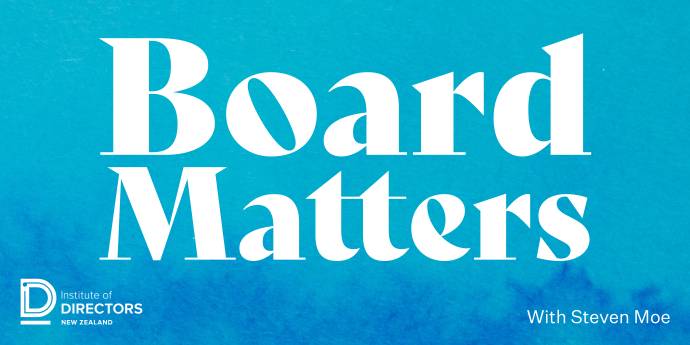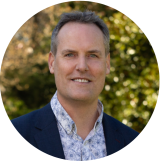Te Rika Temara-Benfell: “A path has been laid for us”
Young Māori leaders are carving out a path for the next generation – IoD’s Aspiring Māori Director Awardee is one of them.

Join host Steven Moe MInstD in conversation with leading directors in Aotearoa New Zealand for Board Matters Season 1. In each episode, Steven and his guest discuss their governance journey, what motivates them and their vision for the future of governance.
Steven and guests were all participants on the IoD's inaugural Advanced Directors Course. As part of the course, participants were asked "what would the title of your own book on governance be, and why?" Find out what Steven's guests said.
IoD members can self-log 1 CPD point for every four episodes listened to (totalling 1 hour of CPD).
Listen to the episodes below or on your favorite podcast app, including:
Spotify | Apple Podcast Player | Google Podcasts | Amazon Music | iHeartRadio
In this episode host Steven Moe MinstD talks with Dr. Peter Stevens CMInstD, Chief Executive of GS1 NZ, an organisation which develops global standards and solutions to improve the efficiency and visibility of supply chains globally. Peter has also sat on a number of boards across the education and not-for-profit sectors.
In this episode, Peter notes that boards need to know where they are heading and to set the direction of travel. Board meetings should be front-loaded with what is ahead of the organisation when directors are fresh, rather than being fixated on reporting what has happened in the past. He also challenges boards to ensure they have the right skills at the board table and asks "where are the scientists and engineers on our boards?"
In this episode host Steven Moe MinstD talks with Maxine Graham who is a director at Pūmau Limited, board member of Te Arataura (Waikato Tainui Tribal Executive) and has spent much of her career on the advancement of Māori in education, workforce and business initiatives.
The discussion centers on "reindigenising" governance practices and how this will shape organisations in Aotearoa and across the world as the movement gathers pace.
“I stand here not as myself, I stand here in the footsteps of my tūpuna to make decisions for my mokopuna to come,” says Maxine about her role in governance. A big part of how that is framed is in ‘connections’ and the relationship between people, the community and environment. We need to remember who we are serving and to acknowledge we represent those who have come before us and those who will come after.
In this episode host Steven Moe MInstD talks with Melanie Templeton who has just stepped down as Chair of PledgeMe Ltd, is an Independent Director of Motor Trade Finance and Booster Investment Management Ltd, and also sits on a number of risk and audit committees.
Melanie says that directors need to constantly evaluate their skillsets to become more diverse, culturally aware and future-focused. Likewise, adaptive boards need to be culturally intelligent and have a strong emphasis on their own purpose as a foundation to build on. She says that Aotearoa New Zealand's uniqueness is drawn from te ao Māori and it's great to see it being brought more into boardroom culture and practices.
Melanie also offers us a challenge as directors - to engage with our stakeholders to bring benefits to our communities and the environment in addition to shareholders.
In this episode host Steven Moe speaks to Giselle McLachlan, who describes herself as a down-to-earth governance and business adviser on a mission to help 1000 kiwi businesses to flourish through great governance. She is founder of Grounded Governance, Chair of AbacusBio, Councillor of Te Kaunihera Medical Council and has previously chaired the Audit Committee for the Institute of Financial Advisors and the Medical Council.
Giselle says that boards need to be future-focused, and as part of this, need to have good succession planning. Directors need to be constantly evaluating their own performance and refreshing their governance skills on an ongoing basis. She also talks about boards increasingly being places where directors can bring their whole selves, not just their director personas and offers directors a challenge - stop looking at the paucity of time and start to think about how much time we do have and where we should give it.
In this episode host Steven Moe MInstD talks with Joe Hanita who was until recently associate director on Wakatū Incorporation's board (now in a senior leadership role) and also sits on a number of audit and risk committees of Māori entities.
Joe explores his long-term, intergenerational perspective on governance, rooted in te ao Māori. He says that good directors are open to learning from others and there needs to be a commitment to lifelong learning in the governance community. Organisations also need to have a greater understanding of why they exist and they need to have long term value creation as a goal - not at the expense of the environment but with greater acknowledgement of our interdependency with it. To achieve this, we need to be our authentic selves and become courageous leaders.
In this episode host Steven Moe MInstD talks with Kevin Jenkins, founder of MartinJenkins, a professional services firm advising businesses, the public sector, international organisations, and NGOs on organisational performance, public policy, finance and economic, and how best to use data. Kevin is also a contributor to the NZ Herald newspaper and other channels, and writes on a range of governance issues for the Institute of Directors in New Zealand.
Kevin asks if the Four Pillars of Governance Best Practice can be applied successfully when working at the speed of a start-up company? His answer touches on the importance of time for contemplation, an understanding of company purpose and a willingness to find efficient ways to govern.
He also looks at the evolution of board reports – shorter, with better dashboards and future-focussed, and explores the rise of Decentralised Autonomous Organisations (DAOs) and how these might affect decisions made by boards in the future.
In this episode host Steven Moe MInstD talks with Jana Rangooni CMInstD who is chair of Paralympics New Zealand, sits on the board of Toi Mai Workforce Development Council and is the Bay of Plenty representative on the Institute of Directors National Council.
In this podcast, she stresses the importance of directors having curiosity and a willingness to ask relevant questions, even if they are difficult. “One of the key roles of directors is to understand things,” she says, “and to understand what is going on in the world and the environment we operate in.”
To coincide with Māori language week in 2022, host Steven Moe MInstD sat down with Ngahihi o te ra Bidois t talk about Māori perspectives at the board table and embedding te reo and tikanga Māori in the boardroom.
Among his governance roles, Bidois is the chair of the Eastern Region Fish and Game Council and the Tauhara North No. 2 Trust. He is an internationally recognised inspirational speaker.
Te Reo Māori is an official language of New Zealand and should be heard in our boardrooms, says Ngahihi. He says Māori would be more likely to join the governance community, and enhance its diversity, if they saw it was welcoming of Māori perspectives.
In this episode host Steven Moe MInstD talks with Samantha Sharif CMInstD. Samantha is a director of ASX-listed New Talisman Gold, SIL/MFL Mutual Funds, Motor Trades Association and is deputy chair of the NZ Shareholders Association.
Samantha says understanding purpose is imperative to good governance. “The question is part of a bigger conversation around purpose and that is the lens you have got to bring to the table,” she says.
In this episode Steven talks with Julia Chambers CMInstD who is Chair of Humble Bee ltd, a company focussed on replacing petrochemical plastics with bio-plastic substitutes. She is also a non-executive director on Lincoln Agritech Limited.
Working in the start-up sector, Julia found herself shoulder-tapped to join boards. One of her big learnings was to continue to be true and to “honour the things that are important” when she moved into the boardroom. “The rate of change is accelerating,” she says, challenging directors to reflect on their personal suitability for board roles in the modern world.
“If it’s not you anymore, then step aside and let someone else fill that seat. The boards I am involved with, I tell you, we are really precious about those seats and who sits in them because of the impact that having the right person, the right team, can have.”
In this episode host Steven Moe MInstD talks with Rachel Afeaki-Taumoepeau CMInstD about the "relative pace of Governance."
Rachel is chair of the Tonga Business Council and her governance roles include sitting on the board of Ember Wellbeing Trust and the advisory board of the Auckland Council Waterfront TAG Place Committee.
Rachel understands the challenges of developing in governance, based on 20 years as a “Pasifika” presence at the board table.
“I did become that one woman at the table, and the table was men who were all pakeha. I became the youngest person at the table, the young female.”
It is important to keep that young and open mindset as you gain experience in order to govern well in fast-changing times, rather than become set in your thinking, she says.
In this episode host Steven Moe MInstD talks with Jonathan Mason CFInstD who is the chair of Vector and sits on the boards of Air New Zealand and the University of Auckland Foundation.
Jonathan talks about the importance of careful scrutiny of the financials of the organisation to keep it in a sound state and the key to protecting shareholder value. He also notes that directors must also identify, and understand the needs of, a wider group of stakeholders when making decisions.
He says that there have been arguments, historically, to just look at shareholders but, today, directors must recognise that a sustainable business strategy includes a stakeholder strategy.
In this episode Steven talks with Chris Webber MInstD who sits on the board of health provider Te Rau Matatini (Te Rau Ora) and is a strong advocate for Māori-run health programmes.
In this podcast, Webber talks about wayfinding, a concept which comes from the Pacific navigation methodology. In this context, wayfinding is about how you maintain your waka, he says.
“You point it in the right direction, you take notice of all the signs that come, that you have trained to be aware of, and the island comes towards you. It’s another way of thinking about things.”
Boards need to choose a destination and take notice of signs – be they changes in the world, transformations in communities or legal and regulatory challenges – as they navigate their organisations, Webber says.
Steven Moe MInstD
 Steven is a partner at Parry Field Lawyers and works across the country in corporate law providing advice to companies and ‘for purpose’ organisations. His current board roles include Chair of Community Finance (which has raised $165m for social housing), XRB Advisory Panel, Global Alliance of Impact Lawyers APAC region board, Parry Field Charitable Foundation, Whānau Whenua Whare Trust, HooHa Arts Trust (Christchurch buskers festival) and Christian Savings Limited.
Steven is a partner at Parry Field Lawyers and works across the country in corporate law providing advice to companies and ‘for purpose’ organisations. His current board roles include Chair of Community Finance (which has raised $165m for social housing), XRB Advisory Panel, Global Alliance of Impact Lawyers APAC region board, Parry Field Charitable Foundation, Whānau Whenua Whare Trust, HooHa Arts Trust (Christchurch buskers festival) and Christian Savings Limited.